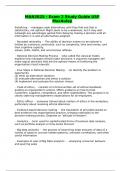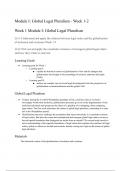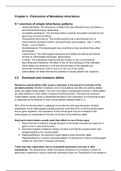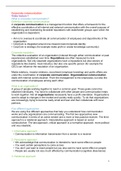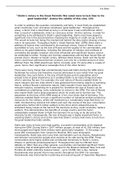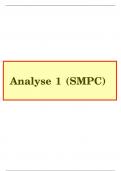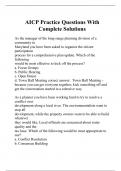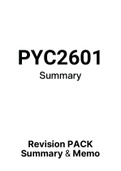MAN3025 - Exam 2 Study Guide USF
MacAulay
Satisficing - -managers seek alternatives until they find one that is
satisfactory, not optimal. Might seem to be a weakness, but it may well
outweigh any advantages gained from delaying making a decision until all
information is in and all alternatives weighed.
- Bounded rationality - -The ability of decision makers to be rational is
limited by numerous constraints, such as complexity, time and money, and
their cognitive capacity,
values, skills, habits, and unconscious reflexes.
- Rational Decision-Making Process - -Also called the classical model,
explains how managers should make decisions; it assumes managers will
make logical decisions that are the optimal means of furthering the
organization's best interests
- Four Steps in Rational Decision Making - -(1) identify the problem or
opportunity
(2) think up alternative solutions
(3) evaluate alternatives and select a solution
(4) implement and evaluate the solution chosen
- Code of ethics - -consists of a formal written set of ethical standards
guiding an organization's actions. Offers guidance on how to treat
customers, suppliers, competitors, and other stakeholders. The purpose is to
clearly state top management's expectations for all employees.
- Ethics officer - -someone trained about matters of ethics in the workplace,
particularly about resolving ethical dilemmas
- Evidence-based decision-making - -the translation of principles based on
best evidence into organizational practice, bringing rationality to the
decision-making process. Depends on "attitude of wisdom".
- Analytics - -term used for sophisticated forms of business data analysis,
such as portfolio analysis or time-series forecast.
- Big-data analytics - -the process of examining large amounts of data of a
variety of types to uncover hidden patterns, unknown correlations, and other
useful information.
- Examples of uses of Big Data analytics - --Analyzing consumer behavior
and spurring sales
, -Improving hiring and human resource management.
-Tracking movie, music, TV, and reading data.
-Advancing health and medicine
-Aiding public policy
- Decision making styles - -reflects the combination of how an individual
perceives and responds to information.
Directive = action-oriented decision makers who focus on facts
Analytical = careful decision makers who like lots of information and
alternative choices
Conceptual = decision makers who rely on intuition and have a long-term
perspective
Behavioral = the most people-oriented decision makers
- Clan culture - -has an internal focus and values flexibility rather than
stability and control. An employee focused culture valuing flexibility, not
stability.
- Hierarchical Culture - -has an internal focus and values stability and
control over flexibility. A Structured Culture Valuing Stability and
Effectiveness.
- Market culture - -has a strong external focus and values stability and
control. A Competitive Culture Valuing Profits over Employee Satisfaction.
- Adhocracy culture - -has an external focus and values flexibility. A Risk-
Taking Culture Valuing Flexibility.
- Types of culture (competing values framework) - -
- How do you learn culture - -Culture is transmitted to employees in several
ways, most often through such means as (1) symbols, (2) stories, (3) heroes,
(4) rites and rituals, and (5) organizational socialization.
- Person-organization Fit or "Fit" - -How well you fit in. Reflects the extent to
which your personality and values match the climate and culture in an
organization
- 12 Mechanisms used to change organizational culture - -(1) formal
statements; (2) slogans and sayings; (3) rites and rituals; (4) stories,
legends, and myths; (5) leader reactions to crises; (6) role modeling,
training, and coaching; (7) physical design; (8) rewards, titles, promotions,
and bonuses; (9) organizational goals and performance criteria; (10)
measurable and controllable activities; (11) organizational structure; and
(12) organizational systems and procedures.
MacAulay
Satisficing - -managers seek alternatives until they find one that is
satisfactory, not optimal. Might seem to be a weakness, but it may well
outweigh any advantages gained from delaying making a decision until all
information is in and all alternatives weighed.
- Bounded rationality - -The ability of decision makers to be rational is
limited by numerous constraints, such as complexity, time and money, and
their cognitive capacity,
values, skills, habits, and unconscious reflexes.
- Rational Decision-Making Process - -Also called the classical model,
explains how managers should make decisions; it assumes managers will
make logical decisions that are the optimal means of furthering the
organization's best interests
- Four Steps in Rational Decision Making - -(1) identify the problem or
opportunity
(2) think up alternative solutions
(3) evaluate alternatives and select a solution
(4) implement and evaluate the solution chosen
- Code of ethics - -consists of a formal written set of ethical standards
guiding an organization's actions. Offers guidance on how to treat
customers, suppliers, competitors, and other stakeholders. The purpose is to
clearly state top management's expectations for all employees.
- Ethics officer - -someone trained about matters of ethics in the workplace,
particularly about resolving ethical dilemmas
- Evidence-based decision-making - -the translation of principles based on
best evidence into organizational practice, bringing rationality to the
decision-making process. Depends on "attitude of wisdom".
- Analytics - -term used for sophisticated forms of business data analysis,
such as portfolio analysis or time-series forecast.
- Big-data analytics - -the process of examining large amounts of data of a
variety of types to uncover hidden patterns, unknown correlations, and other
useful information.
- Examples of uses of Big Data analytics - --Analyzing consumer behavior
and spurring sales
, -Improving hiring and human resource management.
-Tracking movie, music, TV, and reading data.
-Advancing health and medicine
-Aiding public policy
- Decision making styles - -reflects the combination of how an individual
perceives and responds to information.
Directive = action-oriented decision makers who focus on facts
Analytical = careful decision makers who like lots of information and
alternative choices
Conceptual = decision makers who rely on intuition and have a long-term
perspective
Behavioral = the most people-oriented decision makers
- Clan culture - -has an internal focus and values flexibility rather than
stability and control. An employee focused culture valuing flexibility, not
stability.
- Hierarchical Culture - -has an internal focus and values stability and
control over flexibility. A Structured Culture Valuing Stability and
Effectiveness.
- Market culture - -has a strong external focus and values stability and
control. A Competitive Culture Valuing Profits over Employee Satisfaction.
- Adhocracy culture - -has an external focus and values flexibility. A Risk-
Taking Culture Valuing Flexibility.
- Types of culture (competing values framework) - -
- How do you learn culture - -Culture is transmitted to employees in several
ways, most often through such means as (1) symbols, (2) stories, (3) heroes,
(4) rites and rituals, and (5) organizational socialization.
- Person-organization Fit or "Fit" - -How well you fit in. Reflects the extent to
which your personality and values match the climate and culture in an
organization
- 12 Mechanisms used to change organizational culture - -(1) formal
statements; (2) slogans and sayings; (3) rites and rituals; (4) stories,
legends, and myths; (5) leader reactions to crises; (6) role modeling,
training, and coaching; (7) physical design; (8) rewards, titles, promotions,
and bonuses; (9) organizational goals and performance criteria; (10)
measurable and controllable activities; (11) organizational structure; and
(12) organizational systems and procedures.

